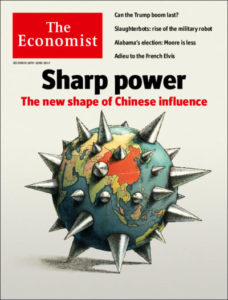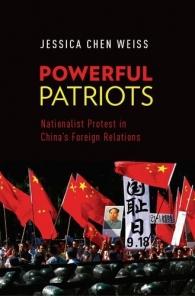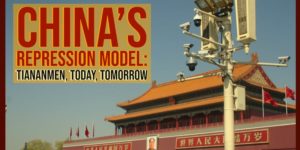 China’s assertion of sharp power is one reason why Canada must develop a comprehensive strategy to strengthen cultural diplomacy as a pillar of foreign policy, according to a new Senate committee report, Cultural Diplomacy at the Front Stage of Canada’s Foreign Policy, released on Tuesday.
China’s assertion of sharp power is one reason why Canada must develop a comprehensive strategy to strengthen cultural diplomacy as a pillar of foreign policy, according to a new Senate committee report, Cultural Diplomacy at the Front Stage of Canada’s Foreign Policy, released on Tuesday.
Some authoritarian regimes are taking steps within the cultural sphere to “improve their international image,” said Christopher Walker, Vice President, Studies and Analysis, with the National Endowment for Democracy. Those regimes “have spent billions of dollars to shape public opinion and perceptions around the world, employing a diverse range of resources that includes cultural activities, educational programs, people-to-people exchanges and the development of media initiatives that have global reach,” he said in testimony to the committee. Those efforts “cannot be divorced from the political values by which [authoritarian regimes] govern at home,” and they therefore pose challenges to the integrity of democratic institutions, he added.
Since 2012, China’s growing authoritarianism and resurgent state dominance over the economy have dashed Western hopes that China would eventually embrace liberalism. And China’s actions abroad have offered alternatives to U.S.-led international institutions, made the world safer for other authoritarian governments, and undermined liberal values, notes Jessica Chen Weiss, Associate Professor of Government at Cornell University.
But those developments reflect less a grand strategic effort to undermine democracy and spread autocracy than the Chinese leadership’s desire to secure its position at home and abroad, she writes for Foreign Affairs:
Its efforts to revise and work around international institutions are the result of pragmatic decisions about Chinese interests rather than a wholesale rejection of the U.S.-led international order. Beijing’s behavior suggests that China is a disgruntled and increasingly ambitious stakeholder in that order, not an implacable enemy of it. In seeking to make the world safer for the CCP, Beijing has rejected universal values and made it easier for authoritarian states to coexist alongside democracies. And within democracies, the CCP’s attempts to squelch overseas opposition to its rule have had a corrosive influence on free speech and free society, particularly among the Chinese diaspora.
 These are real challenges, but they do not yet amount to an existential threat to the international order or liberal democracy, argues Chen Weiss, the author of Powerful Patriots: Nationalist Protest in China’s Foreign Relations:
These are real challenges, but they do not yet amount to an existential threat to the international order or liberal democracy, argues Chen Weiss, the author of Powerful Patriots: Nationalist Protest in China’s Foreign Relations:
At home and abroad, the CCP is fighting a defensive ideological battle against liberal norms of democracy and human rights, but so far at least, it is not engaged in a determined effort to spread autocracy. In order to respond to Beijing’s actions effectively, the United States and its allies will need to be more precise about what exactly China is doing. In the end, the best way to respond to China is to make democracy work better. That would set an example for others to follow and allow the democratic world to compete with the true sources of China’s international power: its economic and technological might.
 It has become almost an article of faith that the U.S. and China are stumbling into a tech cold war — a superpower slugfest for mastery of future technologies and, with them, the global economy, analyst Michael Schuman writes for Bloomberg (HT:FDD). The best path for China may be to follow in the footsteps of Japan and Korea — to produce a few leading companies able to carve out a global presence and become an integral part of the world’s tech landscape. But that hardly describes a cold war. It sounds more like capitalist competition.
It has become almost an article of faith that the U.S. and China are stumbling into a tech cold war — a superpower slugfest for mastery of future technologies and, with them, the global economy, analyst Michael Schuman writes for Bloomberg (HT:FDD). The best path for China may be to follow in the footsteps of Japan and Korea — to produce a few leading companies able to carve out a global presence and become an integral part of the world’s tech landscape. But that hardly describes a cold war. It sounds more like capitalist competition.
China has been diligently working to redefine its global image as a model for many liberal institutions, despite evidence to the contrary, the Hudson Institute adds. They claim to be a proponent of anti-corruption, a champion of free trade, and dedicated to international development and humanitarian aid. At the same time, under Xi’s leadership, Beijing has sought to reverse many of the political, social, and economic developments that emerged from 30 years of liberal reform. How will China’s illiberal reversions influence the future world order and how can the West ensure the dominance of liberal values?*
 Hudson Institute will host a discussion on China’s increasingly illiberal propensities and how they are increasingly challenging the liberal values of the West. Panelists will include Hudson Institute’s Patrick Cronin, Harvard University’s Philippe Le Corre, the Carnegie Endowment for International Peace’s Evan Feigenbaum, and the Brookings Institution’s Tarun Chhabra. The conversation will be moderated by Hudson Senior Fellow Liselotte Odgaard.
Hudson Institute will host a discussion on China’s increasingly illiberal propensities and how they are increasingly challenging the liberal values of the West. Panelists will include Hudson Institute’s Patrick Cronin, Harvard University’s Philippe Le Corre, the Carnegie Endowment for International Peace’s Evan Feigenbaum, and the Brookings Institution’s Tarun Chhabra. The conversation will be moderated by Hudson Senior Fellow Liselotte Odgaard.
Wednesday, June 19
9:15 a.m. to 11:00 a.m.
Hudson Institute
Stern Policy Center
1201 Pennsylvania Avenue, N.W. Suite 400
Washington, DC 20004 RSVP







